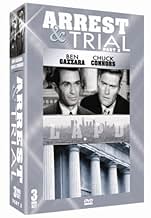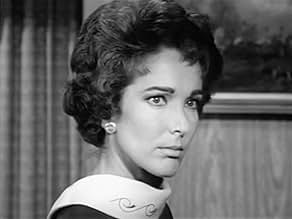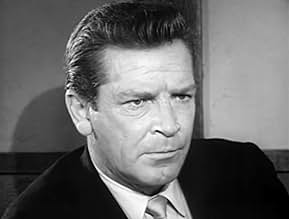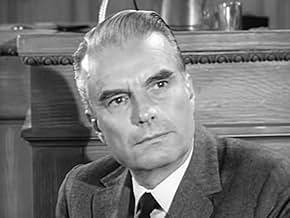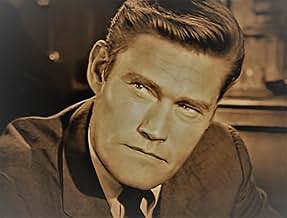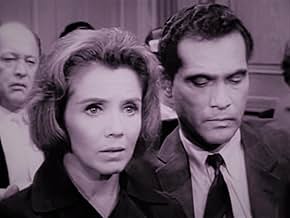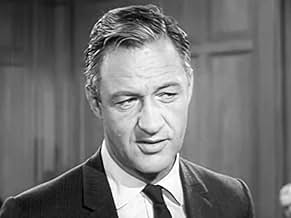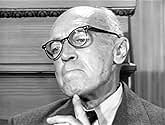Los Angeles is where Sergeant Nick Anderson and his fellow officers work to keep the streets safe. After the arrest of the accused, attorney John Egan plans their defense, while the prosecut... Read allLos Angeles is where Sergeant Nick Anderson and his fellow officers work to keep the streets safe. After the arrest of the accused, attorney John Egan plans their defense, while the prosecution is led by Jerry Miller.Los Angeles is where Sergeant Nick Anderson and his fellow officers work to keep the streets safe. After the arrest of the accused, attorney John Egan plans their defense, while the prosecution is led by Jerry Miller.
- Nominated for 4 Primetime Emmys
- 4 nominations total
Browse episodes
Featured reviews
Created by Earl Bellamy, "Arrest and Trial" was an early attempt to meld, a la "Law and Order", the processes of apprehending criminals, then following the legal system as the cases would be resolved. As 'cop' shows and 'lawyer' shows were among television's most popular genres at the time, ABC and Universal thought the program would be a major hit, and provided first-class talent both in front of, and behind the camera.
The 'Arrest' phase starred 33-year old Ben Gazzara, a highly respected actor who had made his mark on Broadway in "Cat On a Hot Tin Roof", and in film, in ANATOMY OF A MURDER. Possessing a quick, analytical mind, and a wry sense of humor, Gazzara's 'Nick Anderson' would quickly cut through alibis, and make arrests, aided by fellow detectives Roger Perry ("Harrigan and Son") and Noah Keen ("The Crimebusters").
The 'Trial' phase returned TV's "Rifleman", Chuck Connors, to the small screen, as John Egan, an intimidating yet sensitive attorney, and featured veteran actors John Larch (WRITTEN ON THE WIND) and John Kerr (SOUTH PACIFIC) as D.A.s representing the State.
While not as intellectual as "The Defenders", "Arrest and Trial" was unique as either side could win or lose a case, as opposed to Perry Mason's nearly flawless record. This was heady stuff for the early sixties!
Unfortunately, being on television's 'Number 3' network did the series in, as ABC had a much harder time attracting viewers than CBS and NBC, particularly when the program was promoted as 'quality'.
It would take 30 years before "Law and Order" could make the formula work!
The 'Arrest' phase starred 33-year old Ben Gazzara, a highly respected actor who had made his mark on Broadway in "Cat On a Hot Tin Roof", and in film, in ANATOMY OF A MURDER. Possessing a quick, analytical mind, and a wry sense of humor, Gazzara's 'Nick Anderson' would quickly cut through alibis, and make arrests, aided by fellow detectives Roger Perry ("Harrigan and Son") and Noah Keen ("The Crimebusters").
The 'Trial' phase returned TV's "Rifleman", Chuck Connors, to the small screen, as John Egan, an intimidating yet sensitive attorney, and featured veteran actors John Larch (WRITTEN ON THE WIND) and John Kerr (SOUTH PACIFIC) as D.A.s representing the State.
While not as intellectual as "The Defenders", "Arrest and Trial" was unique as either side could win or lose a case, as opposed to Perry Mason's nearly flawless record. This was heady stuff for the early sixties!
Unfortunately, being on television's 'Number 3' network did the series in, as ABC had a much harder time attracting viewers than CBS and NBC, particularly when the program was promoted as 'quality'.
It would take 30 years before "Law and Order" could make the formula work!
The short lived television series "Arrest And Trial" was the forefront of the critically acclaimed dramas of the 1960's. This part police procedure, part detective drama, and part courtroom drama was on the same level as "Perry Mason", "The Defenders", and "Dragnet" that lasted one season on ABC's prime time schedule airing on Sunday nights from 8:30-10:00pm (Eastern) that ran 90 minutes with commercials and station identification airing from September 15, 1963 until April 19, 1964. A total of 30 episodes were produced in black and white with the series being produced by Revue Studios/Universal Television and was filmed at the studios of Universal City in association with the ABC Television Network.
The series faced stiff competition on it's Sunday night schedule where it went up against NBC's "The Bill Dana Show", and "Bonanza ",and the second half of CBS' "The Ed Sullivan Show",and "The Judy Garland Show". The majority of the episodes consisted of two segments. First was "The Arrest" that follows Detective Sergeant Nick Anderson (Ben Gazzara) and his partner Detective Dan Kirby(Roger Perry) of the Los Angeles Police Department along with Lieutenant Detective Carl Bowie (Noah Keen) along with Detective Mitchell Harris (Don Galloway) and Joesph Higgins as they solve crimes and vicious murders as they hunt down and captured vicious criminals who may have been connected to other acts as well as other crimes in which they bring them to justice. The apprehended suspect is read his constitutional rights and is brought to trial in a court of law.
The second half of the program "The Trial" begins with the defended being assigned to the criminal attorney John Egan (Chuck Conners) who was often against the Deputy District Attorney Jerry Miller (John Larch) and the Assistant District Attorney(Barry Pine) where the defended is tried and convicted before a judge and a jury whether if they are found guilty or not guilty depending on the outcome of the case. The series was nominated for Four Prime Time Emmys for Outstanding Dramatic Series during it short lived run. With executive producer Frank P. Rosenburg along with producers Earl Bellamy, Arthur H. Nadel and Charles Russell this series was absolutely brilliant that had a plethora of guest stars each week with top notch direction and fantastic writing that set the tone in modern day 1960's Los Angeles. The best episodes from the series were "Onward and Upward", "Roll Of The Dice", "The Witnesses", "A Shield Is For Hiding Behind", "Inquest For A Bleeding Heart", "Tears From A Silver Dipper", and "Call It A Lifetime".
Creator and producer Dick Wolf Of "Law and Order" took a cue from this 1960's television series and adapted it in the 1990's that had the same format but it was more successful. But still "Arrest And Trial" remains a bonafide classic of brilliant television from the 1960's that was critically acclaimed but was suddenly canceled that still requires a good look.
The series faced stiff competition on it's Sunday night schedule where it went up against NBC's "The Bill Dana Show", and "Bonanza ",and the second half of CBS' "The Ed Sullivan Show",and "The Judy Garland Show". The majority of the episodes consisted of two segments. First was "The Arrest" that follows Detective Sergeant Nick Anderson (Ben Gazzara) and his partner Detective Dan Kirby(Roger Perry) of the Los Angeles Police Department along with Lieutenant Detective Carl Bowie (Noah Keen) along with Detective Mitchell Harris (Don Galloway) and Joesph Higgins as they solve crimes and vicious murders as they hunt down and captured vicious criminals who may have been connected to other acts as well as other crimes in which they bring them to justice. The apprehended suspect is read his constitutional rights and is brought to trial in a court of law.
The second half of the program "The Trial" begins with the defended being assigned to the criminal attorney John Egan (Chuck Conners) who was often against the Deputy District Attorney Jerry Miller (John Larch) and the Assistant District Attorney(Barry Pine) where the defended is tried and convicted before a judge and a jury whether if they are found guilty or not guilty depending on the outcome of the case. The series was nominated for Four Prime Time Emmys for Outstanding Dramatic Series during it short lived run. With executive producer Frank P. Rosenburg along with producers Earl Bellamy, Arthur H. Nadel and Charles Russell this series was absolutely brilliant that had a plethora of guest stars each week with top notch direction and fantastic writing that set the tone in modern day 1960's Los Angeles. The best episodes from the series were "Onward and Upward", "Roll Of The Dice", "The Witnesses", "A Shield Is For Hiding Behind", "Inquest For A Bleeding Heart", "Tears From A Silver Dipper", and "Call It A Lifetime".
Creator and producer Dick Wolf Of "Law and Order" took a cue from this 1960's television series and adapted it in the 1990's that had the same format but it was more successful. But still "Arrest And Trial" remains a bonafide classic of brilliant television from the 1960's that was critically acclaimed but was suddenly canceled that still requires a good look.
The 30 episodes (all in B&W) of the 90-minute crime drama "Arrest and Trial" originally ran on ABC during its 1963-1964 broadcast season. The new three-disc DVD set includes nine of the episodes: #3, #4, #7, #11 (guest starring Martin Sheen and Michael Parks), # 15 (guest starring Mickey Rooney), #21, #22 (guest starring Nick Adams), #23, #30; seemingly taken at random from the series.
The series was an innovative concept as it was essentially broken down by the words in its title. During the first 45 minutes of each episode LA detective Nick Anderson (Ben Gazzara) would solve the crime, arrest the perpetrator(s), and hand them over for trial. The second half concerned defense attorney John Egan's (Chuck Connors) attempts to get them acquitted.
That Egan was for the defense and not the prosecution was what made the series unique. Guilt or innocence thus became a relative term. With better writing it could been a great series (think "Hill Street Blues" where the public defender is involved in a romance with the Precinct Captain). Unfortunately rather than actually working in opposition to each other most of the episodes featured little if any interplay between Anderson and Egan. So what you got was more like a 45-minute cop show followed by a 45-minute lawyer show; with the only point in common being the same guest star(s); whose character might just as well have had different names for all it would have mattered.
The series tried to hold the cop show fans over for the second half by ingeniously breaking the show at the quarter hour when it was too late to change channels and watch something else. It must not have worked very well because the ratings were too low to support a second season.
Gazzara was excellent but Connors was horribly miscast. Most likely someone who is seeing Connors' various shows for the first time is mystified than he got so much television work in 1960's. All I can say is that a lot of people were just as mystified then.
Then again, what do I know? I'm only a child.
The series was an innovative concept as it was essentially broken down by the words in its title. During the first 45 minutes of each episode LA detective Nick Anderson (Ben Gazzara) would solve the crime, arrest the perpetrator(s), and hand them over for trial. The second half concerned defense attorney John Egan's (Chuck Connors) attempts to get them acquitted.
That Egan was for the defense and not the prosecution was what made the series unique. Guilt or innocence thus became a relative term. With better writing it could been a great series (think "Hill Street Blues" where the public defender is involved in a romance with the Precinct Captain). Unfortunately rather than actually working in opposition to each other most of the episodes featured little if any interplay between Anderson and Egan. So what you got was more like a 45-minute cop show followed by a 45-minute lawyer show; with the only point in common being the same guest star(s); whose character might just as well have had different names for all it would have mattered.
The series tried to hold the cop show fans over for the second half by ingeniously breaking the show at the quarter hour when it was too late to change channels and watch something else. It must not have worked very well because the ratings were too low to support a second season.
Gazzara was excellent but Connors was horribly miscast. Most likely someone who is seeing Connors' various shows for the first time is mystified than he got so much television work in 1960's. All I can say is that a lot of people were just as mystified then.
Then again, what do I know? I'm only a child.
My title, "Tortured Criminals," refers not to the torturing of criminals but to the fact that on "Arrest and Trial," many or most of the criminals were tortured souls, people out of step with society. Basically good people whose problems, upbringing or outlook on life led them to a criminal act--maybe just one--or to an acting-out crime spree. These lost souls might be addicts, alcoholics, thrill-seekers, seniors experiencing dementia, misguided youth, all of whom seemed okay when not drunk, on drugs, or otherwise affected at the moment by the idiosyncrasies that set them aside from "normal" people. The in-depth look into the character of these lost souls was the heart of the show. Sometimes it just became too much (for the viewer), too maudlin, too many excuses for the improper behavior, too much theorizing about socialization, rehabilitation, upbringing and family life.
The lead casting was a surprise: Ben Gazzara, who went on to star in "Run for Your Life" immediately after the one-year run of "Arrest and Trial," and Chuck Conners, a former baseball player for the Brooklyn Dodgers (among others) who had just finished a 1958-63 stint as the star of "The Rifleman." They didn't quite fit together, although they didn't actually work together since Gazarra was a cop and Conners a prosecuting or defense attorney. Conners, at 6 ft. 6 in. Towered over everybody and didn't seem to fit in the frame. And after a very iconic role as Lucas McCain, the Rifleman, it is hard for viewers to see him as a lawyer, though his penchant for justice and human kindness remained the same.
The supporting cast reads like a list of up-and-coming Who's Who performers, but an outstanding tour de force was accomplished by Jack Weston in the episode, "Birds of a Feather," in which he donned numerous disguises and played completely different characters; sometimes it took a moment to realize it was the same actor.
The music for "Arrest and Trial" leaned toward piano with orchestral background, and sometimes became a bit much; you either like it our you don't. Many of the episodes were shot in interesting locations, a big plus for the one-season series.
All in all, enjoyable, if you can overlook the over-sentimentalization, ongoing behavioral-theory conversations, and an actor who was constantly hitting his head on the underside of the top of your TV set.
The lead casting was a surprise: Ben Gazzara, who went on to star in "Run for Your Life" immediately after the one-year run of "Arrest and Trial," and Chuck Conners, a former baseball player for the Brooklyn Dodgers (among others) who had just finished a 1958-63 stint as the star of "The Rifleman." They didn't quite fit together, although they didn't actually work together since Gazarra was a cop and Conners a prosecuting or defense attorney. Conners, at 6 ft. 6 in. Towered over everybody and didn't seem to fit in the frame. And after a very iconic role as Lucas McCain, the Rifleman, it is hard for viewers to see him as a lawyer, though his penchant for justice and human kindness remained the same.
The supporting cast reads like a list of up-and-coming Who's Who performers, but an outstanding tour de force was accomplished by Jack Weston in the episode, "Birds of a Feather," in which he donned numerous disguises and played completely different characters; sometimes it took a moment to realize it was the same actor.
The music for "Arrest and Trial" leaned toward piano with orchestral background, and sometimes became a bit much; you either like it our you don't. Many of the episodes were shot in interesting locations, a big plus for the one-season series.
All in all, enjoyable, if you can overlook the over-sentimentalization, ongoing behavioral-theory conversations, and an actor who was constantly hitting his head on the underside of the top of your TV set.
This short-lived series was excellent TV for its time.
Half the show was about the police and the other half was about the courts. In the context of some of the TV we see today, doesn't this have a familiar air about it?
"Law and Order"and it's various spin-offs are presently among the most popular shows on TV. This tends to suggest that "Arrest and Trial" was perhaps 40 years ahead of its time.
Half the show was about the police and the other half was about the courts. In the context of some of the TV we see today, doesn't this have a familiar air about it?
"Law and Order"and it's various spin-offs are presently among the most popular shows on TV. This tends to suggest that "Arrest and Trial" was perhaps 40 years ahead of its time.
Did you know
- TriviaAlthough Chuck Connors was considered to be miscast as an attorney, much of the failure of this show to live up to its potential was allegedly due to interference in the show's writing by producer Frank P. Rosenberg. Connors is said to have butted heads many times with management over this, as well as its treatment of the show's staff (he once walked off the set until the studio resumed providing free coffee and donuts for the crew). Rosenberg was said to have a stack of "Arrest and Trial" scripts written by some of the top writers in Hollywood that were ignored, in favor of scripts that were increasingly mediocre. This show was also in one of the worst possible time slots, competing against Bonanza (1959), The Ed Sullivan Show (1948), and The Judy Garland Show (1963). When this show folded after one season, Connors, Universal, and Revue severed their contract by "mutual agreement". A year later, Connors was back on television in another western, Branded (1965) that, oddly enough, ran in the same unenviable time slot as this show, but managed to last two seasons. Ben Gazzara returned to enjoy a three-year run on the television series Run for Your Life (1965), before appearing in three critically acclaimed films directed by his friend, independent film pioneer, John Cassavetes.
- ConnectionsRemade as Arrest & Trial (2000)
- How many seasons does Arrest and Trial have?Powered by Alexa
Details
- Release date
- Country of origin
- Language
- Also known as
- Arresto y juicio
- Filming locations
- Production companies
- See more company credits at IMDbPro
- Runtime1 hour 30 minutes
- Color
- Sound mix
- Aspect ratio
- 1.33 : 1
Contribute to this page
Suggest an edit or add missing content


